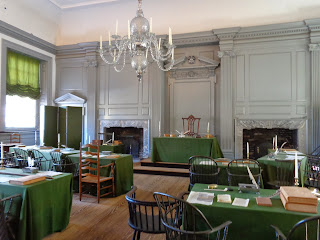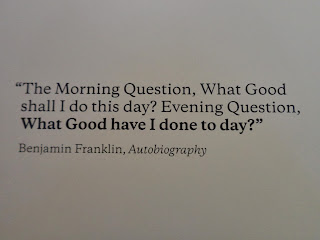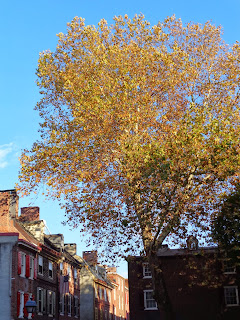My favorite historian, David McCullough, when talking about lessons in history that high school students should learn before graduating, said to learn history through other means than books and teachers. Learn history through music, plays, architecture and by doing drawings, he urges. "Bring them into the tent not just because of books and quotations and dates and boring. Don't do boring. Because it isn't boring. It's about human beings." Also, "Take them to places where things happened."
It is hard to believe that as a life long New Jersey resident, I never had a school trip to Morristown to visit Washington's headquarters at Ford Mansion or any American Revolution sites for that matter. Mr. McCullough wants to plant the seed early to sprout a love of history, but it is never too late for a seed later in life. His advice I believe applies just as much to adults.
Steve and I had a renewed interest in George Washington and the story of the fight for independence when we caught a marathon of the AMC series, Turn, based on Alexander Rose's book, Washington Spies: The Story of America's First Spy Ring. I eagerly anticipate the second season in 2015.
Back to Morristown. It was a mere $4 per person fee to visit Ford Mansion. From my New Jersey Day Trips guide from my local library:
"The winter of 1779-1780 was the coldest in a century. On December 1, 1779, General George Washington entered Morristown and took up residence at the house of Mrs. Jacob Ford, Jr. Meanwhile, 4 miles away at Jockey Hollow, 10,000 men chopped down 600 acres of oak, walnut and chestnut trees to build hundreds of huts along the slopes of the "hollow." Severe snowstorms hindered their work and delayed the supply of meat and bread they needed to survive. Starvation confronted the army, which also suffered from inadequate clothing, disease and low morale. So terrible was the winter of the Morristown encampment that many troops finally mutinied. But history books only tell you about Valley Forge. Why? Because New Jersey has simply never had a very good public relations person."
I thought of the comfortable headquarters here, compared to the primitive conditions of the troops endured at Jockey Hollow.
Pots ready for hearth cooking, and behind them candle making equipment. I think of the labor needed to produce everything from food to light.
In the museum, a display on the "Ascendancy of George Washington." How much do you know about our first president? I was a political science major, and know some but not as much as I would like. It seems people in our age of access to so much information are more well versed in the doings of the Kardashians or other "reality" personalities.
Gilbert Stuart, a sign noted, "painted three portraits of George Washington from life and as many as hundreds more likenesses copied from them. This portrait is a version of one called the Athenaeum portrait."
A marker, "Taste for Refinement," talked about "the smoother a dish, plate or teapot, the more desirable it was to the genteel class, who imported porcelain from England and the Far East. Crude earthenware was more common in colonial homes, but as the 18th century progressed, porcelain and china became available and affordable."
Take a look at your plates at home. Where are they manufactured? So many dishes today will bear a "Made in China" logo. Many of ours do. Steve's mother said she has a set of China from her parents no one wants and I said we'd happily take them, but as she lives in Arizona we have yet to make arrangements. I'd love having dishes with a family history.
A marker calls attention to the art of writing, including letters, logs and diaries. Do you write letters or record thoughts in diaries? My heart is so happy when I get a letter from my pen pal, and I consider my blog to be a diary. A friend suggested I print it out for Grace to read one day, and I love that idea. The film "Nebraska" had me thinking about how much our parents, who are such great shapers of our lives, are such mysteries to us. I hope Grace will know more about me reading this blog one day, and the early adventures we took her on.
A letter with wax seal from 1845 from Dolly Madison to Reverend William Sprague.
Think of all the things we have in our homes for babies today. We've had to make room in ours for Grace's crib, bassinet, changing table, bouncy seat, swing, dresser for her clothes and other items. Never mind her toys, books and such! My car contains her car seat, a pram and stroller. I suspect our grandmothers did just fine without so many things (never mind how much money they did not have to spend).
A sign on "Infancy and Instruction" noted, "Parents of all social classes provided their children with cradles, and a few with baby bottles. Cradles protected them from their homes' chilly drafts. As children grew older, they learned reading and catechism from primer books." Here, a mahogany cradle from Philadelphia, circa 1730-1760.
The New England Primer. I think a lot about language, as Steve so poetically put it, which is alive and changing.
David McCullough talked about the dumbing down of language in history textbooks, and how J.K. Rowling's Harry Potter series defied the conventional belief that modern children do not like to read, doing so without dumbing down the vocabulary in the slightest. A topic around our kitchen table has been the dumbing down of American society. We have all this knowledge at our fingertips, but it seems to be more about distraction instead of education, and far too much fluff. As for our claims of valuing "education," it seems at times our society values competitive sports more. Thoughts?
Off to the Jockey Hollow visitors' center, where you can view a recreated military hut interior.
I considered the harsh realities faced by the soldiers: severe cold unimaginable to us, extended separation from loved ones, the violence they witnessed, and starvation. How long could you survive without food? That day, I had apple cinnamon oatmeal and coffee for breakfast, a pumpkin yogurt parfait and pear as a midmorning snack, for lunch a hearty lentil vegetable soup, raspberry rose tea and then an apple as a snack. By the time we got to Jockey Hollow, we got two small bags of trail mix at the visitors center! I don't think I'd last very long. Never mind poor, poor me when I have to take the dogs outside for 10 minutes in the cold to return to my snug, warm home. History puts everything into perspective.
David McCullough thinks if the founding fathers were to come back today they would be amazed that the constitution and form of government they put into place still exists, and with our dentistry, medicine, our capacity to build, the speed of communication and travel, but would be disappointed about the role of money in our political system and they would find us "soft." I agree.
With Grace in the car, we took turns walking up the hill to see the recreated soldiers huts. We both remarked on the sense of peace we felt here walking along the trail.
A marker at the bottom of the hill notes the contributions of the sons of Ireland. "Seven out of the eleven brigades at Jockey Hollow were commanded by generals born in Ireland or had Irish parents. It is estimated that one quarter of the entire Continental Army was from Ireland."
"Saint Patrick's Day was the one holiday General Washington granted in the army in Jockey Hollow during the hard winter in 1779-80. He hoped that by recognizing the Irish holiday that it might further political unrest in Ireland."
I could have lingered for a long time at the Wick Farm, but dusk was approaching and the air was growing chilly. A sign here notes of the farm's importance in sustaining Washington's army.
I just recently learned that pie plant is also the name for garden rhubarb.
This marker for borage notes it flavors drinks and reduces fever. We've advanced so far in medicine, but I think too have strayed from the knowledge of the healing powers in our gardens. It's easy to take a pill, but is that always the best solution?
The garden was getting ready for its winter slumber. I already so miss going out in the garden with the baby. I had ambitious hopes for a vegetable garden this year, but with a newborn to care for it never materialized and we just had herbs and flowers. We're a little worried about air quality issues by us with a garden since a nearby quarry often pollutes our air. Where to go to that's clean and safe?
The sign for the smokehouse notes, "The farmer packed meat such as fish, chicken, beef and pork in salt to season and preserve.
 The meat was hung from the rafters, below on the dirt floor. A smoky fire was built using wet hickory wood and apple tree logs. After several days the smoked meats were taken down ready to eat or be stored away for winter meals." Laura Ingalls Wilder wrote about her family smoking meat in the first chapter of Little House in the Big Woods, which was set a century after this time period. Fast forward about a century and a half later after that novel, think of how many advances we've made in not having to produce so much of our own food, yet also how far removed we are from where are food comes from. Both good and bad.
The meat was hung from the rafters, below on the dirt floor. A smoky fire was built using wet hickory wood and apple tree logs. After several days the smoked meats were taken down ready to eat or be stored away for winter meals." Laura Ingalls Wilder wrote about her family smoking meat in the first chapter of Little House in the Big Woods, which was set a century after this time period. Fast forward about a century and a half later after that novel, think of how many advances we've made in not having to produce so much of our own food, yet also how far removed we are from where are food comes from. Both good and bad.
Do you know the source of your drinking water when you turn on the tap? I think of how much bottled water is in our modern life, and all that plastic waste, so much not recycled. When I see this well, I think of Laura's chapter, "Fresh Water to Drink" in Little House on the Prairie in which she describes the laborious, dangerous process of building one and the rewarding results. "The water was clear and cold and good. Laura thought she had never tasted anything so good as those long, cold drinks of water. Pa hauled no more stale, warm water from the creek."
In our area, there is a multimillion-dollar plan to drain three reservoirs on Garret Mountain and replace them with concrete tanks.
Our local NorthJersey.com reported, "Adopted in 2006, LT2 is a rule that requires all utilities that store treated drinking water in open-air reservoirs to either cover those facilities or re-treat the water. The rule aims to protect water from fecal contamination by birds and wildlife." There are now it seems almost eleventh hour efforts to stop this project. Again, it seems how much we have advanced from with labor in getting water, but how little we think about this life-giving source we cook with, bath in, and lauder clothing in.
The rustic fence looks out onto the sleepy fields, with so many ghosts of the revolution. My visit here left me with so much to think about. You do not have to travel far or have a lot of money to have a rich and rewarding vacation. We had more to come...
We had a tired baby, so we ate at home. Inspired by the garden, an arugula, corn, pepper, tomato and cheese salad, on apple plates (thrifted from the Goodwill, and made in China, incidentally). I'm going to start using more of our blue and white antique dishes. Our vacation of day trips (often they were just afternoon trips) saved so much on dining and lodging. It's cosier in our own home with our dogs by our side anyway. There really is no place like home.


















.JPG)




















































